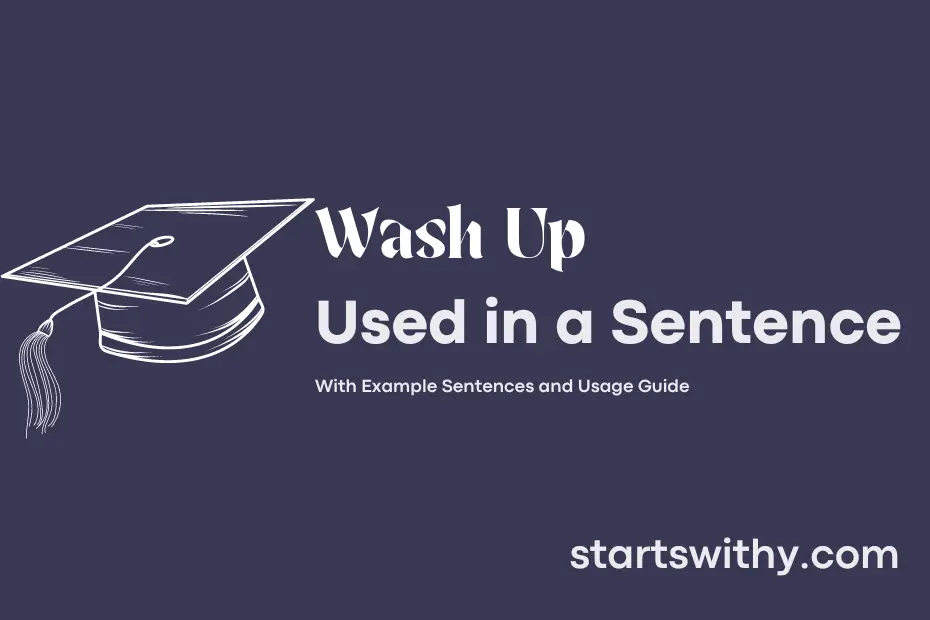Ever wonder what the phrasal verb “wash up” really means? In simple terms, it refers to cleaning oneself or washing one’s hands and face.
Often used in everyday conversations, this expression is commonly employed after meals or activities to maintain cleanliness and refresh oneself.
7 Examples Of Wash Up Used In a Sentence For Kids
- Wash up before eating your lunch.
- Don’t forget to wash up after playing outside.
- It’s important to wash up before going to bed.
- Remember to wash up before painting or drawing.
- Let’s all wash up before starting our activities.
- Did you wash up before coming to school?
- Always wash up after using the restroom.
14 Sentences with Wash Up Examples
- Wash up before heading to the mess for dinner.
- Don’t forget to wash up after your sports practice.
- It’s important to wash up before handling food in the hostel kitchen.
- Make sure to wash up before going to bed to avoid spreading germs.
- Always wash up before heading to your next class.
- Remember to wash up after using the communal bathroom.
- Wash up your dishes after eating at the canteen.
- Before meeting with your study group, be sure to wash up.
- Don’t skip washing up before meeting your professors during office hours.
- After a long day of lectures, relax and wash up before bed.
- If you’re feeling stressed, maybe a nice shower to wash up will help.
- After a late-night study session, take a moment to wash up before hitting the sack.
- Before heading to a college event, take time to wash up and freshen up.
- Running late for class? Quick wash up before rushing out the door.
How To Use Wash Up in Sentences?
To use “Wash Up” correctly in a sentence, follow these steps:
- Identify the appropriate context for using “Wash Up” in your sentence. It usually refers to cleaning oneself or washing dishes after a meal.
- Begin your sentence with a subject, such as “I” or “We”.
- Insert the main verb, “Wash Up,” in the appropriate place in the sentence. For example, “After playing outside, I need to wash up before dinner.”
- Make sure to include any necessary details or adverbs to provide context to your sentence. For instance, “My children always wash up before bedtime.”
- Double-check your sentence for correct grammar, punctuation, and tense.
- Practice constructing more sentences using “Wash Up” in different situations to become more comfortable with its usage.
Here are a few examples to help you understand how to use “Wash Up” effectively in a sentence:
- “After gardening, she decided to wash up before preparing lunch.”
- “Before the party, we all need to wash up and change into our fancy clothes.”
- “The chef instructed his team to wash up after finishing cooking for the day.”
By following these simple guidelines and practicing regularly, you will soon become proficient in using “Wash Up” in sentences with ease.
Conclusion
In conclusion, incorporating sentences with “wash up” into our conversations or writing can help to convey the action of cleaning oneself or something. These sentences are simple and effective in portraying tasks related to personal hygiene or tidying up, creating a clear image in the reader’s mind. Furthermore, using “wash up” adds a touch of everyday language that is relatable and easily understood by a wide audience.
Whether you are describing someone cleaning their hands before a meal or tidying dishes after dinner, sentences with “wash up” serve as a straightforward way to communicate cleaning actions in a concise and accessible manner. By utilizing these phrases in communication, we can enhance clarity and efficiency in our descriptions and narratives.



